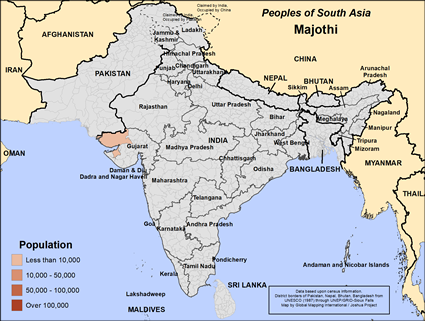Majothi in India

Photo Source:
Anonymous
|

Map Source:
People Group data: Omid. Map geography: UNESCO / GMI. Map Design: Joshua Project
|
| People Name: | Majothi |
| Country: | India |
| 10/40 Window: | Yes |
| Population: | 900 |
| World Population: | 900 |
| Primary Language: | Kacchi |
| Primary Religion: | Islam |
| Christian Adherents: | 0.00 % |
| Evangelicals: | 0.00 % |
| Scripture: | New Testament |
| Ministry Resources: | No |
| Jesus Film: | Yes |
| Audio Recordings: | Yes |
| People Cluster: | South Asia Muslim - other |
| Affinity Bloc: | South Asian Peoples |
| Progress Level: |
|
Introduction / History
The Majothi people in Gujarat have a background primarily connected to agriculture and traditional crafts. They primarily speak Gujarati, which is widely spoken in the region.
What Are Their Lives Like?
The Majothi people live in rural villages and small towns, focusing on farming and small-scale craftsmanship. They grow crops such as wheat, rice, and vegetables. Many also engage in weaving, pottery and other artisanal crafts.
Their diet includes both vegetarian and non-vegetarian food, featuring staples like rice, lentils, vegetables and occasional meat or fish. Traditional dishes such as dal (lentil soup), roti (flatbread), and shaak (vegetable curry) are common in their meals.
Weddings among the Majothi are elaborate, involving rituals like the exchange of garlands, sacred fire ceremonies, and celebrations with music and dance. Family, community and religion are very important to the Majothi people.
What Are Their Beliefs?
The Majothi people are Sunni Muslims who believe that the supreme God, Allah, spoke through his prophet, Mohammed, and taught mankind how to live a righteous life through the Koran and the Hadith. To live a righteous life, you must utter the Shahada (a statement of faith), pray five times a day facing Mecca, fast from sunup to sundown during the month of Ramadan, give alms to the poor, and make a pilgrimage to Mecca if you have the means. Muslims are prohibited from drinking alcohol, eating pork, gambling, stealing, slandering and making idols. They gather for corporate prayer on Friday afternoons at a mosque, their place of worship.
The two main holidays for Sunni Muslims are Eid al Fitr, the breaking of the monthly fast and Eid al Adha, the celebration of Abraham's willingness to sacrifice his son to Allah.
Sunni religious practices are staid and simple. They believe that Allah has pre-determined our fates; they minimize free will.
In most of the Muslim world, people depend on the spirit world for their daily needs since they regard Allah as too distant. Allah may determine their eternal salvation, but the spirits determine how well we live in our daily lives. For that reason, they must appease the spirits. They often use charms and amulets to help them with spiritual forces.
What Are Their Needs?
The Majothi people need better access to quality education to provide more opportunities for their children. Improved healthcare services are essential due to limited availability of medical facilities and high rates of preventable diseases. Economic support through modern agricultural techniques, market access, and vocational training can enhance their livelihoods. Infrastructure development, including better roads, clean water supplies, and reliable electricity, will greatly benefit the Majothi community. Addressing these needs will help the Majothi people achieve greater socio-economic stability while preserving their traditional way of life.
Prayer Points
Pray for his kingdom to come and his will to be done among the Majothi people.
Pray for a movement of Majothi households to study the Bible and accept the blessings of Christ.
Pray for a spiritual hunger that will drive the Majothi people to the arms of Jesus.
Pray for workers who are filled with the fruit and the power of the Holy Spirit to go to the Majothi people.